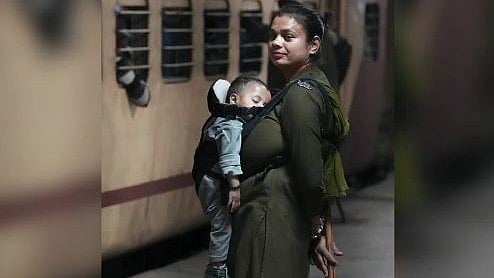
Constable Reena
Credit: X/@RPF_INDIA
A video of a female Railway Protection Force constable carrying a child while on duty recently went viral, drawing widespread praise—even from some parliamentarians—for her dedication. While her determination to balance bother work and childcare is definitely commendable, the incident raises a broader questions: should we not be demanding better institutional support for working mothers?
Across sectors—public and private—many working mothers struggle to manage both work and childcare. While increasing women’s workforce participation is a key focus of the Indian government, the latest International Labour Organisation report flags that 53% of the Indian women remain outside the labour force due to caregiving responsibilities. In contrast, only 1.1% of men are out of the workforce for the same reason.
Women have traditionally shouldered the primary responsibility for childcare, often receiving little support to balance it with their paid or unpaid work. The burden of unpaid care work disproportionately affects women’s access to education, employment, leisure, health, and overall well-being. As a result, women are forced into informal or unstable work, accept lower-paying jobs with reduced work hours, or leave the workforce altogether. This unequal burden is especially severe for women from marginalised communities. In a patriarchal society like ours, questioning this status quo is discouraged—women who do are considered a “bad mother” or “insensitive”.
India’s Integrated Child Development Scheme (ICDS) provides a network of Anganwadis to support childcare for children aged three to six years. However, there are minimal alternative care options for children under three, forcing many mothers to compromise on their workforce participation.
Various laws over time have mandated childcare facilities at workplaces. A significant milestone was the Maternity Benefit Act (2017), which strengthened childcare provisions. However, a key criticism of the Act is that it primarily benefits women in the formal sector, leaving out the vast majority of India’s informal workforce—81.8% of women are in the informal sector, and the majority of them are in rural areas. Moreover, many women, especially in rural areas, remain unaware of their childcare entitlements under existing laws and schemes. The glorification of women “managing” both work and childcare without institutional support only further normalises their struggles. The government must focus on creating awareness among women and ensure these benefits reach those who need them most. Civil society organisations must also step in to support this effort.
A promising model in this regard is Karnataka’s Koosina Mane (crèche) initiative, which provides childcare for children of women working under the Mahatma Gandhi National Rural Employment Guarantee Act (MGNREGA). Implemented by gram panchayats, the programme began in 2023 and now includes 3,892 functioning centres that provide care, nutritious food, and early childhood education to over 33,000 children aged six months to three years.
By offering these services, Koosina Mane enables women to participate more actively in MGNREGA and earn a stable income, which otherwise would be difficult due to childcare responsibilities. The initiative also creates employment for other women: Koosina Mane caregivers, who are MGNREGA workers, receive training and are paid the scheme’s wage (Rs 349 per day in Karnataka). Several gram panchayats have gone beyond basic implementation—Nallur Gram Panchayat in Davangere, for example, has even arranged transport facilities for children using its own revenue, improving access to these services.
While the MGNREGA (2005) mandates deputing a caretaker to look after children under six, its implementation has been patchy nationwide. Karnataka remains the only state to take an institutional and systemic approach through Koosina Mane. This model should be expanded nationally, extending beyond MGNREGA workers to benefit all women in the informal workforce.
Decentralisation is key to ensuring childcare facilities reach the grassroots level. Community participation enhances accountability and service quality. In fact, the Karnataka Panchayat Raj Act (1993) mandates that gram panchayats establish crèche facilities within their jurisdiction. Governments at all levels must empower local bodies to fulfil this responsibility. Expanding initiatives like Koosina Mane at a national level would complement existing services under ICDS, ensuring that children from six months to six years receive comprehensive care through the public system. In a welfare state like India, this is not charity—it is a commitment.
The society should collectively demand public childcare centres in all workplaces, with a focus on informal workplaces. The glorification of women “balancing” work and childcare without institutional support is not a praise--it is patronising. Global studies consistently shown that access to childcare improves women’s workforce participation, enhancing their economic and social empowerment.
(The writer is programme officer at the Karnataka Panchayat Raj Commissionerate, Department of Rural Development and Panchayat Raj, Government of Karnataka)